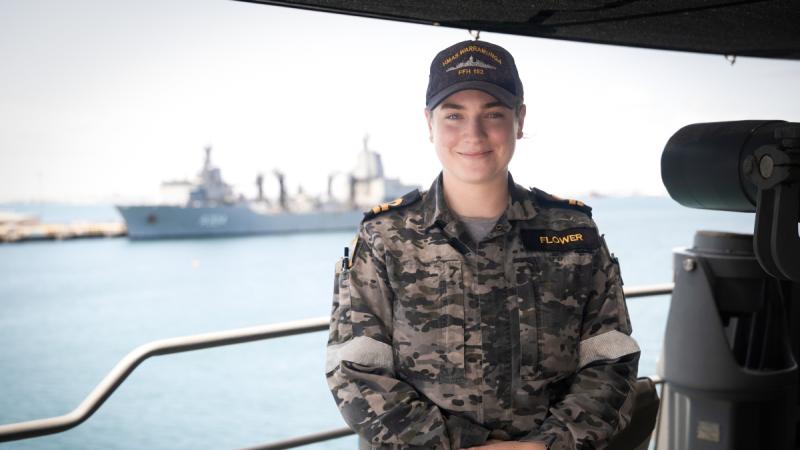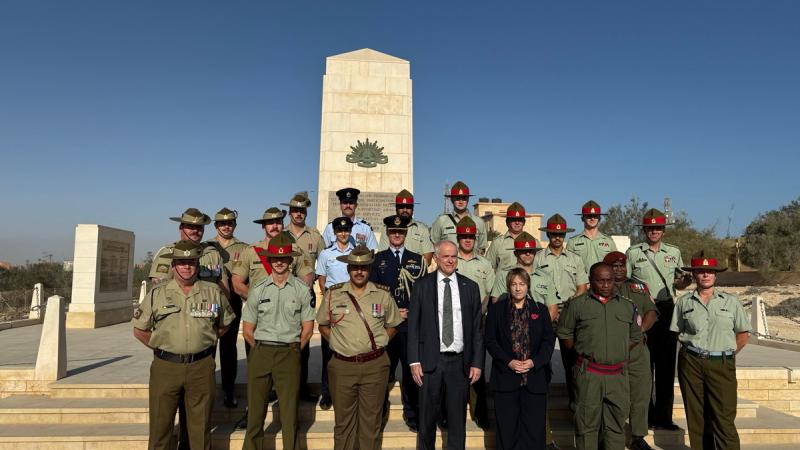13 October 2025
“Lima, this is Victor …
“Mayday, mayday, mayday …
“We’ve been hit in the vicinity of Bravo 37 …
“Multiple casualties …
“Acknowledge, over.”
With those words, the lives of Lieutenant Commander Travis Robinson and his multinational United Nations Military Observer team patrolling the Lebanon-Israel border would change forever.
Deployed on Operation Paladin – the ADF’s contribution to the United Nations Truce Supervision Organisation (UNTSO) – the nursing officer was leading a three-person on-foot patrol, call sign ‘Victor’, when an improvised explosive device (IED) exploded on March 30, 2024.
“The approved plan was to inspect the Blue Line as per the UNTSO Mandate, as the area had not been closely inspected since the conflict began on October 7, 2023,” Lieutenant Commander Robinson said in the official report.
Following standard operating procedures and UN protocols, Lieutenant Commander Robinson confirmed three times with Observer Group Lebanon Operations Centre, call sign ‘Lima’, to ensure the Israeli Defence Force and Lebanese Armed Forces were aware of Team Victor’s intent to conduct a vehicle patrol in that area.
On arrival at the site, the road was not driveable due to a previous airstrike, requiring the team to leave their vehicles.
The patrol wore their body armour, blue UN helmets and ballistic glasses, and carried two UN flags while proceeding on foot.
About 80 metres into the foot patrol, an IED was triggered next to the team, critically injuring all three.
“I was blown off my feet and spun due to large pieces of fragmentation, and blacked out for approximately two to three seconds,” Lieutenant Commander Robinson said.
“When I came to, I couldn’t see my Chilean and Norwegian teammates due to the smoke and debris in the air.”
'Navy’s ability to train how we fight not only sets us up to win; it also empowers us with the resilience that’s required when things get tough, both as individuals and as an organisation.'
With all three team members wounded – one sustaining serious injuries to the face, arms and legs – the decision had to be made whether to call for casualty evacuation or to self-rescue.
Knowing they remained in significant danger and aware of the severity of his team’s wounds, Lieutenant Commander Robinson decided to evacuate using their vehicles.
Despite his own shrapnel injuries and head injury, he carried his Chilean colleague to the backseat of the vehicle so he could continue treating her wounds, while also treating his Norwegian colleague, who was driving.
Concurrently, Lieutenant Commander Robinson provided radio updates to headquarters and the waiting trauma team.
The most seriously injured team member was flown by helicopter from their patrol base to Beirut for emergency surgery, while Lieutenant Commander Robinson and his Norwegian colleague were driven to a Lebanese civilian hospital for further treatment.
On April 7, 2024, a Royal Australian Air Force medical team medically repatriated Lieutenant Commander Robinson due to his worsening injuries.
A subsequent UN investigation in April this year concluded that an IED had been specifically placed for the express purpose of denying access along the track and destabilising the peace process.
For Lieutenant Commander Robinson’s efforts and the injuries he sustained, the Lebanese Government awarded him the Medal for Battle Wounds.
On May 29, 2025, The International Day of United Nations Peacekeepers, Lieutenant Commander Robinson was a guest instructor at the ADF Peace Operations Training Centre in Canberra.
His key message summing up the experience was: “Navy’s ability to train how we fight not only sets us up to win; it also empowers us with the resilience that’s required when things get tough, both as individuals and as an organisation.”


